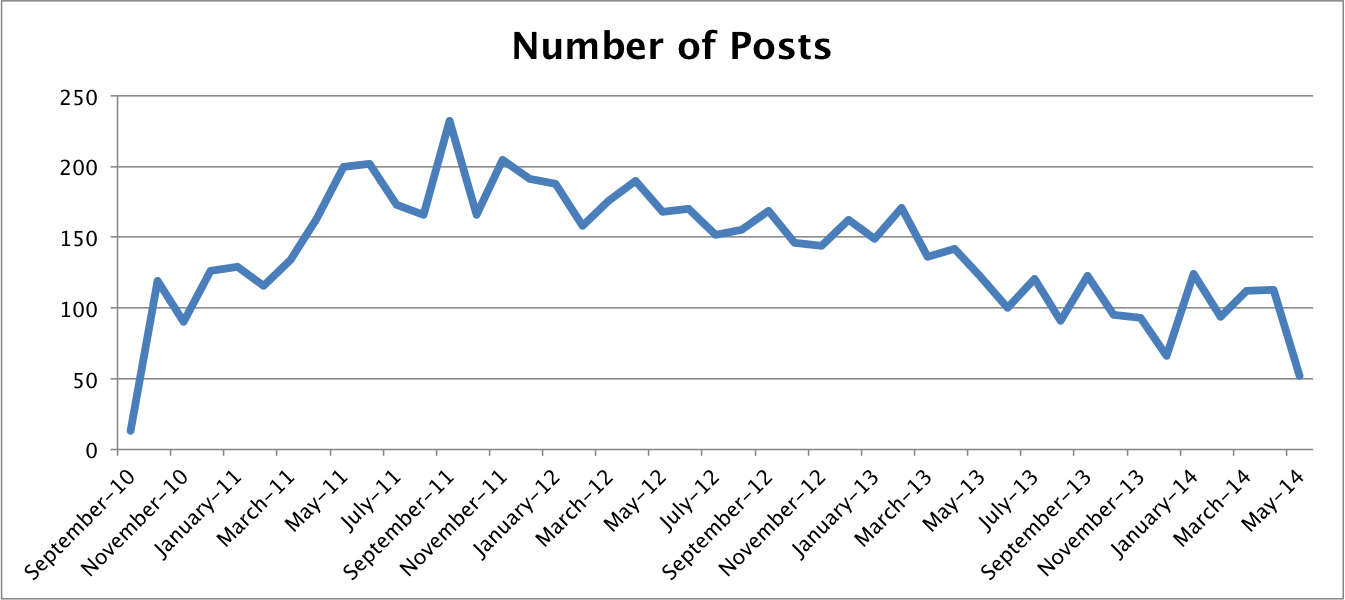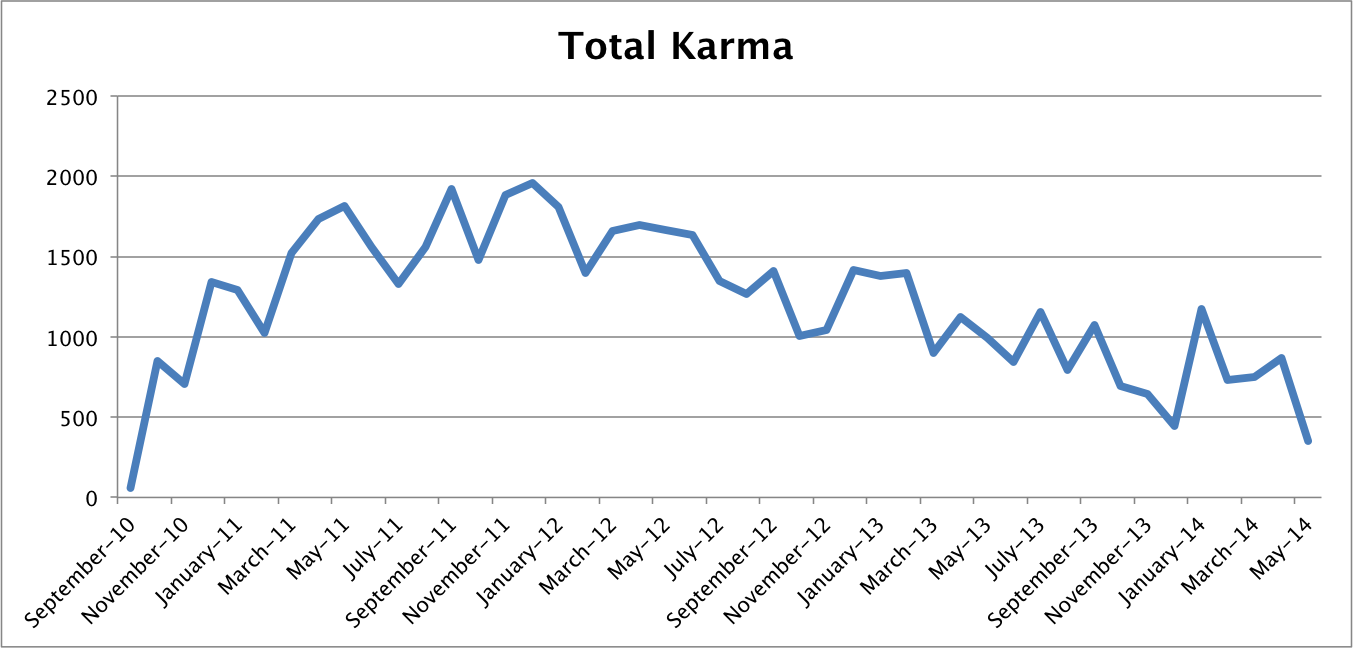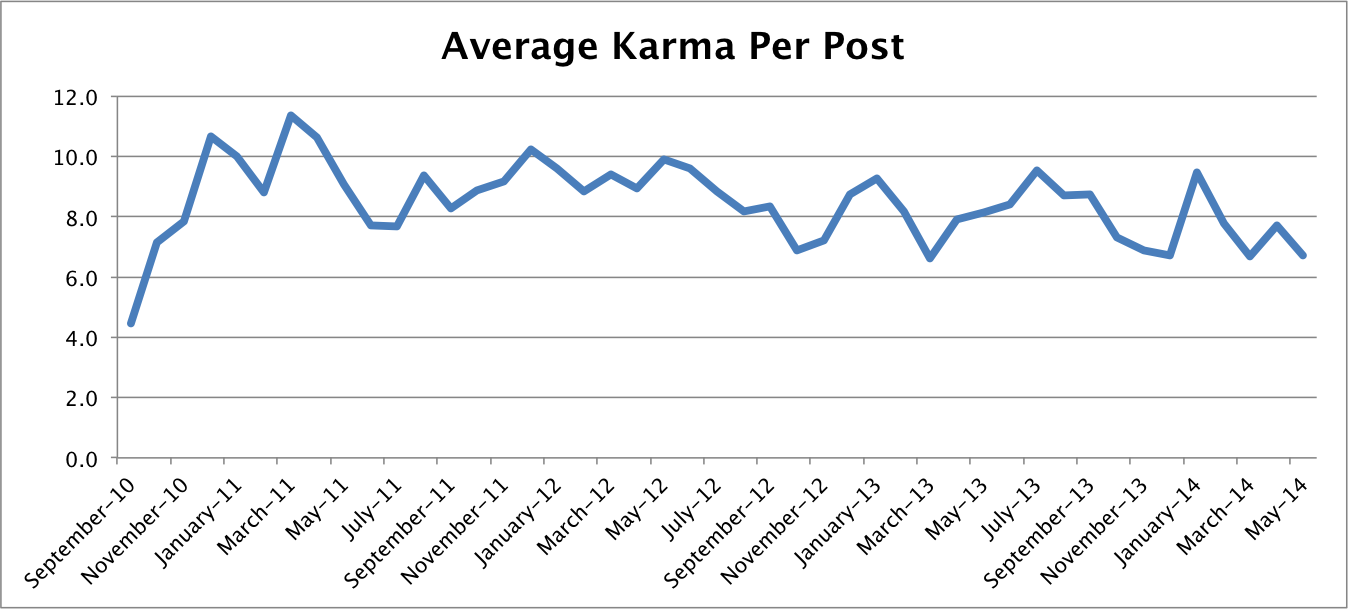[Based on Alexandros's excellent dataset.]
I haven't done any statistical analysis, but looking at the charts I'm not sure it's necessary. The discussion section of LessWrong has been steadily declining in participation. My fairly messy spreadsheet is available if you want to check the data or do additional analysis.
Enough talk, you're here for the pretty pictures.

The number of posts has been steadily declining since 2011, though the trend over the last year is less clear. Note that I have excluded all posts with 0 or negative Karma from the dataset.

The total Karma given out each month has similarly been in decline.
Is it possible that there have been fewer posts, but of a higher quality?

No, at least under initial analysis the average Karma seems fairly steady. My prior here is that we're just seeing less visitors overall, which leads to fewer votes being distributed among fewer posts for the same average value. I would have expected the average karma to drop more than it did--to me that means that participation has dropped more steeply than mere visitation. Looking at the point values of the top posts would be helpful here, but I haven't done that analysis yet.
These are very disturbing to me, as someone who has found LessWrong both useful and enjoyable over the past few years. It raises several questions:
- What should the purpose of this site be? Is it supposed to be building a movement or filtering down the best knowledge?
- How can we encourage more participation?
- What are the costs of various means of encouraging participation--more arguing, more mindkilling, more repetition, more off-topic threads, etc?
Here are a few strategies that come to mind:
Idea A: Accept that LessWrong has fulfilled its purpose and should be left to fade away, or allowed to serve as a meetup coordinator and repository of the highest quality articles. My suspicion is that without strong new content and an online community, the strength of the individual meetup communities may wane as fewer new people join them. This is less of an issue for established communities like Berkeley and New York, but more marginal ones may disappear.
Idea B: Allow and encourage submission of rationalism, artificial intelligence, transhumanism etc related articles from elsewhere, possibly as a separate category. This is how a site like Hacker News stays high engagement, even though many of the discussions are endless loops of the same discussion. It can be annoying for the old-timers, but new generations may need to discover things for themselves. Sometimes "put it all in one big FAQ" isn't the most efficient method of teaching.
Idea C: Allow and encourage posts on "political" topics in Discussion (but probably NOT Main). The dangers here might be mitigated by a ban on discussion of current politicians, governments, and issues. "Historians need to have had a decade to mull it over before you're allowed to introduce it as evidence" could be a good heuristic. Another option would be a ban on specific topics that cause the worst mindkilling. Obviously this is overall a dangerous road.
Idea D: Get rid of Open Threads and create a new norm that a discussion post as short as a couple sentences is acceptable. Open threads get stagnant within a day or two, and are harder to navigate than the discussion page. Moving discussion from the Open Threads to the Discussion section would increase participation if users could be convinced thatit was okay to post questions and partly-formed ideas there.
The challenge with any of these ideas is that they will require strong moderation.
At any rate, this data is enough to convince me that some sort of change is going to be needed in order to put the community on a growth trajectory. That is not necessarily the goal, but at its core LessWrong seems like it has the potential to be a powerful tool for the spreading of rational thought. We just need to figure out how to get it started into its next evolution.
Isn't there something inherently self-destructive about a website that teaches "winning"? I mean, when people start winning in their lives, they probably spend less time debating online...
If someone starts a startup, they have less time to debate online. If someone joins a rationalist community in their area, they also spend less time online, because they spend more time in personal interactions. Even if you just decide to exercise 10 minutes every day, and you succeed, that's 10 minutes less to spend online.
(I don't consider myself very successful in real life, my ambitions are much higher than where I am now, and I still remain in the LW top contributor list only because my time spent on other websites dropped by an order of magnitude.)
Unless your (instrumental) goal is to write something online, as was Eliezer's case. Which suggests that we should write about the things we care about (as long as they can be enjoyed by people who try to be rational). You know, something to protect, without the affective spirals.
So instead of trying to increase the debates on LW (which is a lost purpose per se, unless pleasant procrastination is the goal), the right question is: What is the thing you care about? Is there a topic so important to you, that you are willing to spend your time learning it and becoming stronger? (Is it compatible with rational thinking, or is it just a huge affective spiral?) If you have an important topic, and it can be approached rationally, then that's exactly the thing you should write about... and LW is one of those places where you could publish it.
Maybe the thing stopping you is thinking "but this isn't about rationality; it is about X". Well, drop that thought. This is exactly the difference between the Sequences-era LessWrong and the new LessWrong. Eliezer wrote the meta stuff, and he himself admits that he "concentrated more heavily on epistemic rationality than instrumental rationality, in general" (because that was related to his main issue: programming the AI). You don't have to write this stuff again. (Well, unless you feel extremely qualified to; but you probably don't.) That was Eliezer's calling; you write about your calling. It would perhaps be best for the community if you were an expert on overcoming akrasia, creating communities, teaching or testing rationality, and similar instrumental rationality topics; but if you are not an expert there, you don't need to pretend. Write about the stuff you know. At least write the first article and see the reactions (worst case, you will republish it on your blog later).
Upvoted. My thoughts:
... (read more)For full disclosure, I don't consider myself very successful in real life either, and my ambitions are also much higher than where I am now. This is a phenomenon that my friends from the Vancouver rationalist meetup have remarked upon. My hypothesis for this is that Less Wrong selects for a portion of people who are looking to jump-start their productivity to a new level of lifestyle, but mostly selects for intelligent but complacent nerds who want to learn to think about arguments better, and like reading blogs. Such behavioral tend